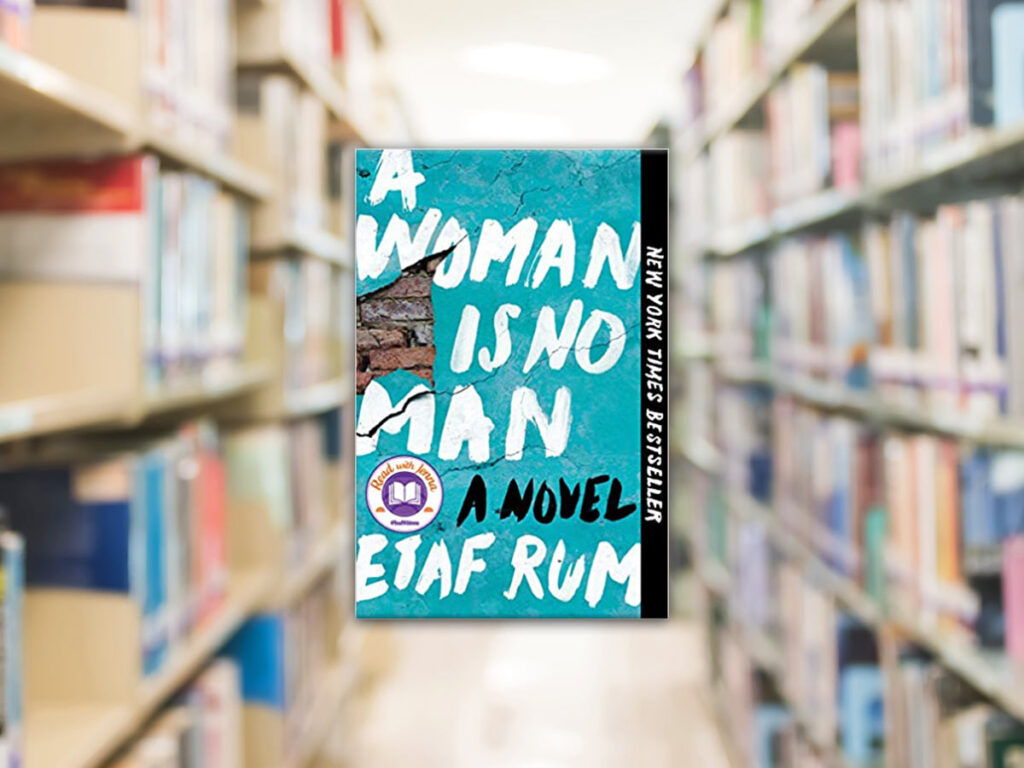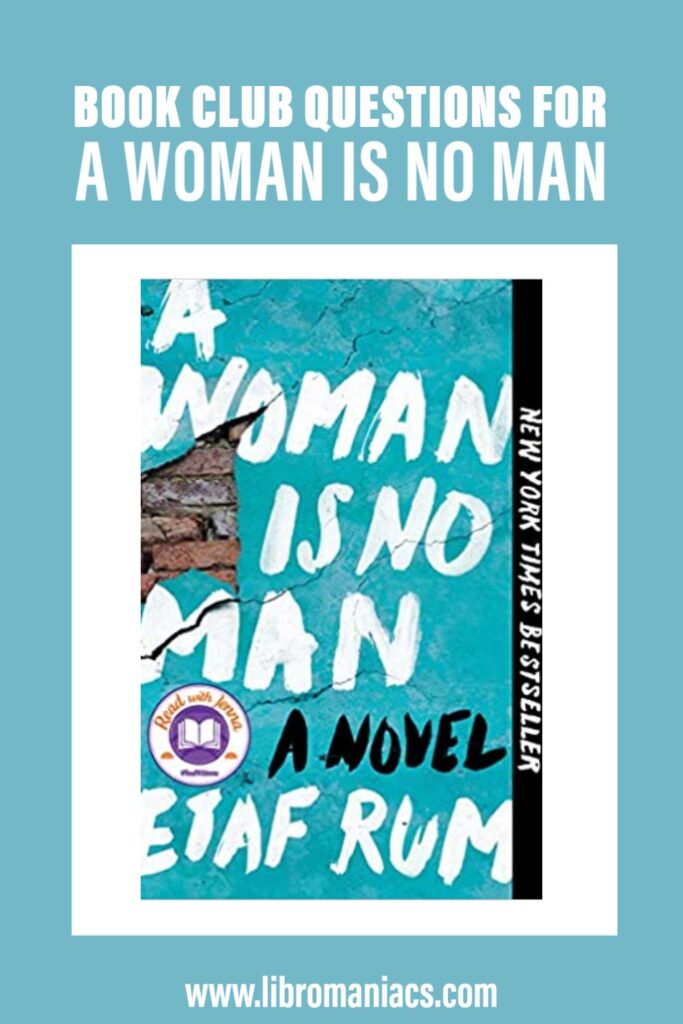In this semi-autobiographical novel, Etaf Rum tackles very difficult themes like domestic violence, cultural assimilation, female agency and messed-up multi-generational family dynamics. Reviews were very mixed for the book and we’re sure your book club will have not trouble finding a lot to talk about.
And, we’re here to help you get started. Use our A Woman is No Man book club questions to help frame your discussion. This discussion guide for A Woman is No Man has 10 discussion prompts, a book synopsis, and snippets of some of those mixed reviews.
And if you liked the book’s themes, read to the bottom, because we have recommendations for three more books like A Woman is No Man.

(This article contains affiliate links. This means that if you choose to purchase, I’ll make a small commission.)
A Woman is No Man Synopsis
A Woman is No Man, Etaf Rum
“Where I come from, we’ve learned to silence ourselves. We’ve been taught that silence will save us. Where I come from, we keep these stories to ourselves. To tell them to the outside world is unheard of—dangerous, the ultimate shame.”
Palestine, 1990. Seventeen-year-old Isra prefers reading books to entertaining the suitors her father has chosen for her. Over the course of a week, the naïve and dreamy girl finds herself quickly betrothed and married, and is soon living in Brooklyn. There Isra struggles to adapt to the expectations of her oppressive mother-in-law Fareeda and strange new husband Adam, a pressure that intensifies as she begins to have children—four daughters instead of the sons Fareeda tells Isra she must bear.
Brooklyn, 2008. Eighteen-year-old Deya, Isra’s oldest daughter, must meet with potential husbands at her grandmother Fareeda’s insistence, though her only desire is to go to college. Deya can’t help but wonder if her options would have been different had her parents survived the car crash that killed them when Deya was only eight. But her grandmother is firm on the matter: the only way to secure a worthy future for Deya is through marriage to the right man.
But fate has a will of its own, and soon Deya will find herself on an unexpected path that leads her to shocking truths about her family—knowledge that will force her to question everything she thought she knew about her parents, the past, and her own future.
10 A Woman is No Man Book Club Questions
These questions have been tailored to this book’s specific reading experience, but if you want more ideas, we also have an article with 101 generic book club questions.
- “Where I come from, voicelessness is a condition of my gender. As normal as the bosoms on a woman’s chest, as necessary as the next generation growing in her belly.”
Where do you see examples of voicelessness in your own community or culture? - “But Isra had learned from a young age that obedience was the single path to love.” These words were from the beginning of the story, when she was still in Palestine. Consider how her life played out. Was she right? Did obedience send her love?
- Consider the role that books and literacy played for Isra, Sarah and Deya. How did they each respond to their reading…what did it do for each of them? What does it do for you?
- Fareeda says that “preserving our culture is what’s important. All you need to worry about is finding a good man to provide for you.” She’s very concerned about not letting her daughter and granddaughters become too Americanized. And yet, there they are, living in America.
What do you think are the pros and cons of living in the US from Fareeda’s point of view? And how do her feelings inhibit the family’s assimilation? - A Thousand and One Nights is Isra’s prized read. In it Scheherazade tells the king stories in order to save her life and the lives of other women at court. Isra sees Scheherazade’s voice as a weapon, saving women. Sarah see it as a made-up story of a guy murdering a bunch of women.
What do you think? - Deya has quite a panic on first subway ride. She worried about how the other passengers perceive her, “Surely she was the victim of an oppressive culture or the enforcer of a barbaric tradition. She was likely uneducated, uncivilized, nobody. Perhaps she was even an extremist, a terrorist. An entire race of culture and experiences diluted into a single story.”
Have you made those sorts of judgement when you’ve seen a woman in a hijab, or found yourself judging folks from other cultures? - So much of the book explores how the women have no agency. But, as the first son, Adam didn’t have much either. How do the family’s pressure play out differently for each gender?
- Ultimately Deya, decides to let go of her old voice, and she realizes that she has to strike out on her own. Have you ever had to make a tough break from family expectations, or cultural and religious traditions?
- Let’s talk about Isra’s self-induced abortion. According to a NY Times article, about 25% of women will have had an abortion by the end of their childbearing years. 60% of them are already mothers and 50% already have 2 or more children. A CDC report states that “One of the main reasons people report wanting to have an abortion is so they can be a better parent to the kids they already have.” So, it seems that many women have made a similar decision to Isra’s hard choice.
What did you think of Isra’s abortion? - The author was raised in Brooklyn by Palestinian immigrant parents, and she has said that the book is semi-autobiographical.
Could this book have been written by someone who wasn’t Muslim, Palestinian, from an arranged marriage or who had experienced domestic violence? Do you agree with some of the book’s critics that it reinforces negative stereotypes of Arab and Muslim cultures?
Selected Reviews for A Woman is No Man
“This book like a gun blast to my chest, ripped my emotions and scatter them all over the places […] There was not any exaggeration, there are too many women in the world suffering the rules from patriarchal culture, customs, illogical traditions made them feel vulnerable, worthless and weak. They never know how important their lives, how to define themselves and mostly how to stand up for their rights.”
“From the first chapter, I could not shed the impression that I was reading a mediocre YA novel, not literary fiction. This book has a distinct lack of complexity or nuance. It is also incredibly repetitive. Characters are always talking to themselves, asking themselves lists of questions, over and over. Scenes, situations and conversations repeat relentlessly […] 5 stars for subject matter. 1 star for delivery.”
“…even as a Palestinian Muslim who has spent her entire life unapologetically refusing to abide by patriarchal norms, the concept of this book scared me. So honest and raw, but so public. Muslims & all POC know too well that you don’t air your dirty laundry. You don’t talk about all your s**t in front of outsiders. Even if it comes at the expense of your community’s advancement, you deny that there are any deeply rooted problems, for fear of confirming stereotypes in all of their false simplicity and orientalism. You deny it for fear of contributing to your community’s otherness, or strengthening the claim that whiteness has in saving you and invading your lands.”
“This book lacks any sort of nuance. Perhaps written by a more deft hand, it wouldn’t have come across so stereotypical and cliched, but the author simply did not have the skill to pull off a balanced narrative. In her interviews, she speaks about the danger of a single story and her fear of compounding stereotypes, but then she just goes right ahead and does that anyway. I don’t want to put the burden of representation on a single person’s shoulders, of course, and I am not denying that misogyny and patriarchy are rife among Arab communities, but there is something about the singular way it is portrayed in this book that got under my skin.”
3 Books Like A Woman is No Man
This book was a pic for the Today Show’s Jenna Bush Hagar book club. If you like her pics, then check out our article on all of Jenna’s pics (rated!). We’ve also got a guide for Honor, which also deals with issue around arranged marriages.
For more on how women are affected by their immigrant experience, try How Not to Drown in a Glass of Water or Solito.

It’s Not About the Burqa: Muslim Women on Faith, Feminism, Sexuality and Race, Miriam Khan et al
It’s Not About the Burqa picks up on A Woman is No Man‘s themes of women’s empowerment (or lack thereof) and the immigrant experience.
In Anglo western culture, the Burqa is one seriously misunderstood piece of cloth. The assumed submissiveness that western culture applies to the women who choose to wear a Burqa, severely diminishes Muslim women’s voices.
This essay collection aims to change that. 17 Muslim women speaking frankly about the hijab and wavering faith, about love and divorce, about feminism, queer identity, sex, and the twin threats of a disapproving community and a racist home country.
The book will completely crack open any stereotypes you may have about Muslim women.

Erotic Stores for Punjabi Widows, Balli Kaur Jaswal
Punjabi Widows is a great pick if you are keen to explore more about gender roles in conservative religious cultures. In it, Nikki is hired to teach Punjabi women English so that they can assimilate better in London. But the ladies have another agenda and the class evolves into an erotic fiction writing class– much to the disapproval of everyone who isn’t in the class.
This book is quite a genre bender. It has the hallmark elements of literary fiction blended with erotica and mystery mixed in. And while the erotica part makes it sound like a light topic, the book actually tackles serious themes like the othering of immigrants, age discrimination, claustrophobic communities, toxic honor and modernism vs tradition.
Read it for book club and use our Punjabi Widows discussion guide.

Educated, Tara Westover
This memoir is a great follow-up if you liked Deya’s storyline and her struggle to broaden her education horizons.
Westover grew up in an abusive, fundamentalist family in southern Idaho. It’s a miracle that she even survived! And yet, she not only did that, but she managed to educate herself, ultimately earning a PhD. Her childhood was fraught with fundamentalist ideology and a profound lack of trust in institutions (including schools). Westover’s story is the ultimate tale in pulling yourself up by the bootstraps.
Lots to talk about here regarding themes of abusive family dynamics, self-motivation and being a fish out of water.
Read it for book club and use our Educated discussion guide.
Have a listen on Audible. Try audio books for free for 30 days.
Share these A Woman is No Man book club questions with your friends:

